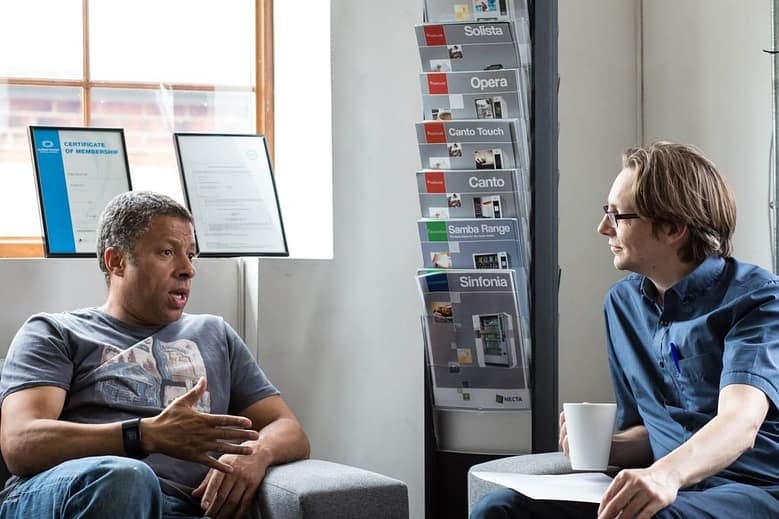Holding space is such a pivotal skill for any healer, yet it’s so under-valued. Your ability to hold space is one of the most important tools you will ever develop, and with this single tool you can help a lot of people.
Everyone goes though struggles. Everyone needs to feel heard, understood, and like they’ve got someone covering their back when things go wrong. So when you provide this service, you become a powerful ally to have on their side — because they’ll see that you actually care for them
Learning how to hold space is a crucial skill for therapists, psychologists, and healers alike because healing comes through feeling. When you facilitate the process in someone else, you will see a huge difference.
In this article, we’re going to explore the art of holding space effectively, and explore the transformative impact it has on individuals. We will delve into the key qualities needed to cultivate a space that invites vulnerability, growth, and healing.
After reading this article, you will know how to create an atmosphere of trust and respect, where others feel seen, heard, and validated.
What it means to hold space

Holding space is to bare witness. It means that you are creating a supportive environment for someone to express themself, and facilitating the process for them to do so.
Imagine you’re seeing a therapist. You go to their office and sit down in a chair facing them. You feel comfortable in the environment to let your guard down, as you know this is the ideal space to vent.
The therapist has all of their attention on you as they ask you a few questions about your life. Suddenly you start talking, and talking, and talking. Maybe you break down into tears or express your anger. You feel safe to completely express yourself and be seen, because the therapist has set up the situation for you to do so.
This is an example of holding space. You’re setting up a space for someone to express themself, and you’re baring witness to their experience. When you’re holding space, you’re not jumping in and taking the spotlight. You’re just being completely present with the person, and allowing them to explore their thoughts, feelings, and experiences without interrupting them.
How does holding space for someone help them?

Holding space for someone can help them a lot regarding their mental and emotional health. Besides the act of healing, it also creates a deeper, human connection with the person, which is beneficial in many ways. Here are a few ways in which holding space can help someone.
It’s healing
What you need to understand is that people carry energies with them. Dense energies that people carry could be sadness, frustration, anger, envy, fear, you name it. If we don’t purge these energies by processing them and discarding them, we hold onto them. It’s not because people don’t want to let them go, but they often don’t know how to.
This is where holding space can really help people out. When you hold space for someone, it provides an opportunity for them to express themselves, vent, and purge dense energies. They can release everything they’re experiencing, because the act of feeling and expressing is a purge.
Therapy works in a similar way, as therapists are really just professionals at holding space. When a therapist sits with their patient and encourages them to speak, they’re facilitating a process. The patient goes through the motions, expresses themself, vents, cries, and lets go of all this stagnant energy.
After you hold space for someone, the person generally feels much better, and you’ll feel a tangible difference in the energy of the room. That person will walk away feeling a whole lot lighter because you gave them a space to purge these energies they’ve been carrying.
It fosters trust
Holding space for someone fosters trust. A big reason for this is because during this process, people open up and allow themselves to be vulnerable. When they see you’re like a rock who can bare witness to them, without being judgmental, they’re going to have a whole lot more trust for you.
Usually when I hold space for people, they’re a bit unsure at the start. After they have gone through their processes and they have seen that I guided them through the entire process without blinking an eye, they feel a whole lot different.
Suddenly, they’re very comfortable and at peace with me. They trust me and know that I’m mature enough to witness their vulnerability. They now see that I am a valuable person to have in their lives, because I provide a skill that not many people do. With that said, they leave feeling a whole lot better, and that trust doesn’t fade away.
It cultivates mutual respect
People will respect you when you hold space for them. Likewise, if you’re a decent person about it, you’ll probably respect them more too after showing the strength to open up to you.
After the energies are cleared, usually there will be a lot of respect for one another, which will help develop a stronger relationship between the two of you. Going off the last point, trust and respect go hand in hand.
Creating the space

Creating a safe space to hold for someone involves both physical and emotional safety. Physically, it means finding a comfortable environment where distractions are minimized. This could be a private room, a cozy corner, even a park bench where you can have a conversation without interruption.
Emotional safety means that you’re creating a space where there’s compassion, understanding, trust, and peace of mind. Making sure that your space is private and confidential is important, because this allows the person to feel comfortable to share their personal thoughts and feelings, and to express themself authentically.
Establish yourself as an authority
You need to establish yourself as the authority in the space. This doesn’t mean to be egotistical in any way, you still want to connect on a heart level and be seen as an equal, but remember, it’s your space that you’re letting the person into.
Tell the person that they can talk about whatever they want, and really just try to put them at ease. Create a comfortable environment, where they also feel willing to speak to someone with experience who can help them. If you’re holding space well and providing a powerful but supporting energy, then they will probably open up straight away.
Hold space in a safe setting
Emotionally, creating safety means setting an intention of non-judgment and acceptance. It means creating an atmosphere where the person feels safe to express themself authentically, without fear of criticism or rejection.
This requires creating an environment where vulnerability is welcomed, honored, and respected. It should be in private and away from the prying ears of other people.
Set clear boundaries
Sometimes when you’re holding space for someone, they’re going to try to latch onto you, or take advantage of your generosity. This is why it’s important to set boundaries, to make sure the set up works for both people. You can’t put their wellbeing over yours if they’re not respecting your boundaries.
Establish what you are willing to offer in terms of support. This could mean putting some limits on the use of your time, energy and resources. You also want to make sure that the person is not taking advantage of your time. If they start projecting their issues onto you, you need to make it clear that you are there to help, and if they won’t be respectful, you will leave.
Never take advantage of their vulnerability
You’re facilitating the space, so you need to be somewhat professional about it, even if you’re with a good friend or your partner. As people open up and allow themselves to be vulnerable, you need to make sure you don’t take advantage of that vulnerability in any way.
Remember, the person needs to trust you. If they realize you’re just trying to get into their pants or get some brownies points, that will really screw up the energy and create more damage than good.
Take care of yourself
When you’re holding space for someone, they’re likely to release a lot of energies. If you’re not careful, you can take on those energies. So you need to practice some self care here.
If you’re feeling a little low, uneasy, or even depressed after helping the person when it’s out of character for you, likely you’ve taken on some dense energies. This tends to happen to people who are sensitive, empathetic, and don’t know how to protect themselves properly.
This is a big reason why I say hold your energy and don’t fall into theirs. Because if you start reacting or empathizing with their pain too much, you might start taking on their stuff. You can become an energetic sponge, so you need to be careful. If you do take something on, it’s essentially yours to take. So you need to meditate, process it, and let it go in your own time.
It’s also good to smudge the room with white sage or Palo Santo before and after holding space for someone, if possible. These materials neutralize the energies in the space and restore it if there’s any dense energy lingering around.
How to effectively hold space for someone

To hold space effectively, it’s important to understand that it’s not about solving the person’s problems. Holding space is about providing a container for their emotions, thoughts, and experiences, and allowing them to process their own journey — while facilitating the experience and baring witness.
By holding space, you offer support and validation. You give the person a shoulder to cry on and make sure that they feel heard. Because a big part of healing comes through feeling acknowledged, that someone actually knows what we’re going through.
By creating a space for growth, healing, and self-discovery, you’ll see how big of an impact this has on the person’s emotional state. Here I’m going to go through some important points to effectively hold space for someone.
Be present
As holding space is to bare witness to someone’s experience, it’s critical that you’re completely present with the person. This means that you’re not thinking about other things or worrying about the time. You’re fully there with the experience, and putting all of your energy into comforting them. Below are a couple helpful guides for you to get into the right headspace.
- Practical mindfulness exercises for beginners: Cultivating presence and inner stillness
- How to get deeper into your meditation practice
Actively listen
You can’t just sit there pretending to listen when everything the person’s saying is going over the top of your head. You need to actively listen and actually take in everything they’re telling you. Believe me, they’ll know whether you’re faking it, or whether you’re actually absorbing what they’re telling you.
Even though holding space is mostly just baring witness, it’s also good to have a heart to heart once the energy has been cleared. To provide the most relevant insight and advice, you need to make sure you’re actually following what they’re telling you.
Don’t be reactive
A big part of holding space is to be centered. Remember, you are the person’s rock, a support pillar to lean on. That means you need to be grounded, and you need to hold a powerful, but calming energy.
Especially if you’re holding space well, people will automatically go into their deepest darkest moments. They will break down into tears, go into fits of anger, maybe they will panic or scream. And you should encourage it, because they’re purging energies which is going to restore inner stability and neutralize their emotional body.
With that said, sometimes things will get a little wild, and it’s your job to be their anchor. Because if you react to them or get sucked into their emotional distress, energies are going to get very tense, very quickly. Reacting to the person’s experience means you’re no longer holding the space, because you’re the one who’s meant to be holding the calming energy, and bringing them back to reality.
So make sure you always remain centered. You don’t match their energy, you don’t fall into theirs. You don’t empathize and cry when they’re crying. You need to be the rock, despite what they’re going through. It’s your job to hold the space you are creating, so make sure you do. Below is a resource which can help you become more centered.
Don’t be judgmental
If you’re holding space for someone, they need to be assured that you’re not going to judge them, regardless what they tell you. Just imagine you’re telling someone something sensitive, and they start laughing at it. Maybe they show visible disgust and give you the ‘what’s wrong with you‘ look. How is this going to make you feel?
Well, I bet you’re going to feel betrayed, and you’re probably not going to tell them anything else. So make sure you don’t judge other people. Being non-judgmental requires you to be compassionate and deeply understanding, because once you master holding space, wounded people will be attracted to you like ants to sugar, so be prepared to hear a lot of crazy stories.
Therefore, remain focused on being there for the person. Don’t judge anything they say, but come from a place of understanding, a place of humanity. People will respect that quality.
Be patient
You cannot rush the process of healing. Some people might talk for a long while because they have a lot to get out. For others, it will take time for them to trust you enough to open up to you. Patience is a virtue, and a very important trait when you’re holding space for people.
So let the person express themself for however long it takes. They should be the one to wrap it up, where they’ll thank you after the energy has been cleared, and feel as if they have nothing more they need to say — because they’re feeling a whole lot lighter.
Remember, holding space isn’t a race. It’s a process. So be with that process for however long it takes, and you’ll know when they’ve gotten over the hump. Below are a few resources to improve your knowledge about the healing process, and how sitting with the experience is a really powerful medicine.
- How to help someone get rid of negative energy
- Fast-track your emotional recovery: Practical healing suggestions to restore the emotional body
- The best coping strategies: What to do when life becomes overwhelming
Keep it confidential
If you want someone to completely open up to you and allow them to be vulnerable, you need to assure them that whatever is said stays between the two of you. And ofcourse, you need to honor that agreement. It’s good to state this at the start of the interaction when you’re opening up the space for them to vent. Tell them that anything they say will not leave the space.
Developing centered listening skills

To hold space effectively, you need to develop empathetic listening skills. I don’t mean reacting to what the person is saying or getting caught into their emotions. I mean understanding them, and visibly showing your support, so the person you’re holding space for knows that you have their back.
To make sure you’re fully with the person, here are some things you should do:
Regularly nod and vocalize
When you nod and vocalize ‘uh hu‘ or ‘mmm‘ every now and then when they’re speaking, it shows that you’re following them. So make sure you’re engaging the person a showing them that you’re fully with them.
Maintain strong eye contact
So you don’t want to be overbearing, but you need to have strong every contact. Your eye contact should be the dominant force because you’re the one holding space. The person will look at you as a sense of security, so if you’re constantly looking away or avoiding eye contact, it’s not a good signal. Make sure your eye contact is strong, and your eyes are soft.
Wait until they finish
Never cut the person off to jump in and offer advice. Sometimes you might have something really good to say, but it’s important to wait until the end, or until there’s a lull in the conversation. Remember, the focus needs to be completely on the person you’re holding space for, in order for it to be effective.
I suggest you read the article below to really know the ins and outs of being a good listener.
Avoid distractions
Make sure your focus remains on the person you’re helping out. Sometimes there will be distractions, loud noises, phone calls, whatever it is. Unless it’s an emergency, don’t give any attention to outside distractions. The person you’re holding space for needs to know you’re with them 100%, that it’s their moment to shine, so make sure you provide that astounding audience.
Providing guidance

What makes this process so effective is that it engages both constituents, the feminine (listening, expressing, connecting), and the masculine (advising, inspiring, motivating). Once they’ve gotten everything out, now it’s time to engage the masculine constituent to provide feedback and to give them something to work with.
After you successfully hold space for someone, you will feel a change in the energy. During this moment, there will be quiet as the person you’re with collects their thoughts, or a lull. This is the right moment to offer some advice and guidance. But there’s some things to know before you do, otherwise you could just complicate the situation.
To learn more about the divine feminine and masculine architype, and how each energy serves a different function, check out the article below.
Thank the person for opening up to you
Once there’s a break in the conversation, you want to thank the person for being vulnerable with you and sharing what they did. Acknowledge that it can be difficult to be vulnerable, and that you commend them for doing so.
Provide direct advice
Don’t beat around the bush. Here you want to give solid advice that hits. Your advice should be relevant to what they’ve been telling you, and it should be direct and impactful. Make sure you cut the BS because at this point, all of their attention will be at you, so make sure you provide some golden nuggets that can really benefit their life moving forward.
Relate to the person with your own story, if applicable
If you connect with their story with one of your own stories, sharing it can help build a sense of camaraderie. So feel free to tell them about your particular experiences, just make sure they’re relevant to the conversation.
With that said, don’t jump in and talk about something just for the sake of speaking, or trying to offer advice. If you have nothing to say, it’s better just to thank the person for speaking, give a quick motivational word or two, and wrap up.
Speak from experience
Don’t speak down to the person, speak as an equal. In saying that, wisdom is key. You should have some authority when you’re talking to them, and that authority comes from experience. Likely, you’ve been in that person’s shoes. If not, maybe you have some knowledge about their situation, have been in a similar situation, or know someone who has been.
Speak from the heart
Make sure you’re speaking from the heart, because this is the opportune moment to have a heart to heart. Don’t do it in a condescending way or show pity, but really aim to connect with the person by showing compassion, and recognizing their difficulties.
Overcoming obstacles of holding space

When you’re holding space for someone, there’s a few things you need to take into account. Sometimes you’ll run into an unexpected hurtle, whether it’s emotions running high, people projecting their issues, or outside distractions. Here we’ll explore some common obstacles when holding space, to make sure everything goes smoothly.
Emotions running high
When someone’s really going through it, emotions might start running high. This can be anything from the person crying, yelling, shaking, you name it. As emotions run high, it becomes easier to get sucked into their energy, because their energetic outlet is stronger.
So when this happens, keep your cool and stay centered. Don’t fall into their energy, and yours will remain the stronger force. As long as you hold your calming energy, they will calm down shortly and return back to the calming space you created.
Projection
Sometimes when you’re holding space for someone, they’re going to start projecting their issues onto you. This is usually the result of hitting triggers (emotional wounds) that their ego reacts to, or as a way to defer responsibility from doing the inner work and healing, as their identity has attached to their trauma.
Either way, it’s not good for you, and you need to make sure people aren’t using you as a stepping stone, as that’s not going to benefit anyone. Refer to what we talked about before about setting boundaries and being willing to leave if they refuse to reason. Below is an article about triggers to help you understand this phenomenon better.
Remain humble
Make sure you’re always being humble, and there’s no ulterior motive to put yourself on a pedestal. Don’t boast or imply how great you are, because it’s just going to create a weird energy and make you look like a fool.
Conclusion
Holding space is an essential skillset for any aspiring healer. This is such a powerful tool that can transmute energy in a matter of minutes. So make sure you understand the process of holding space, and all the details associated with it. Then of course, start practicing every time someone is feeling low.
If you want more information about holding space, click on the link below which will take you to my YouTube video on the topic.

